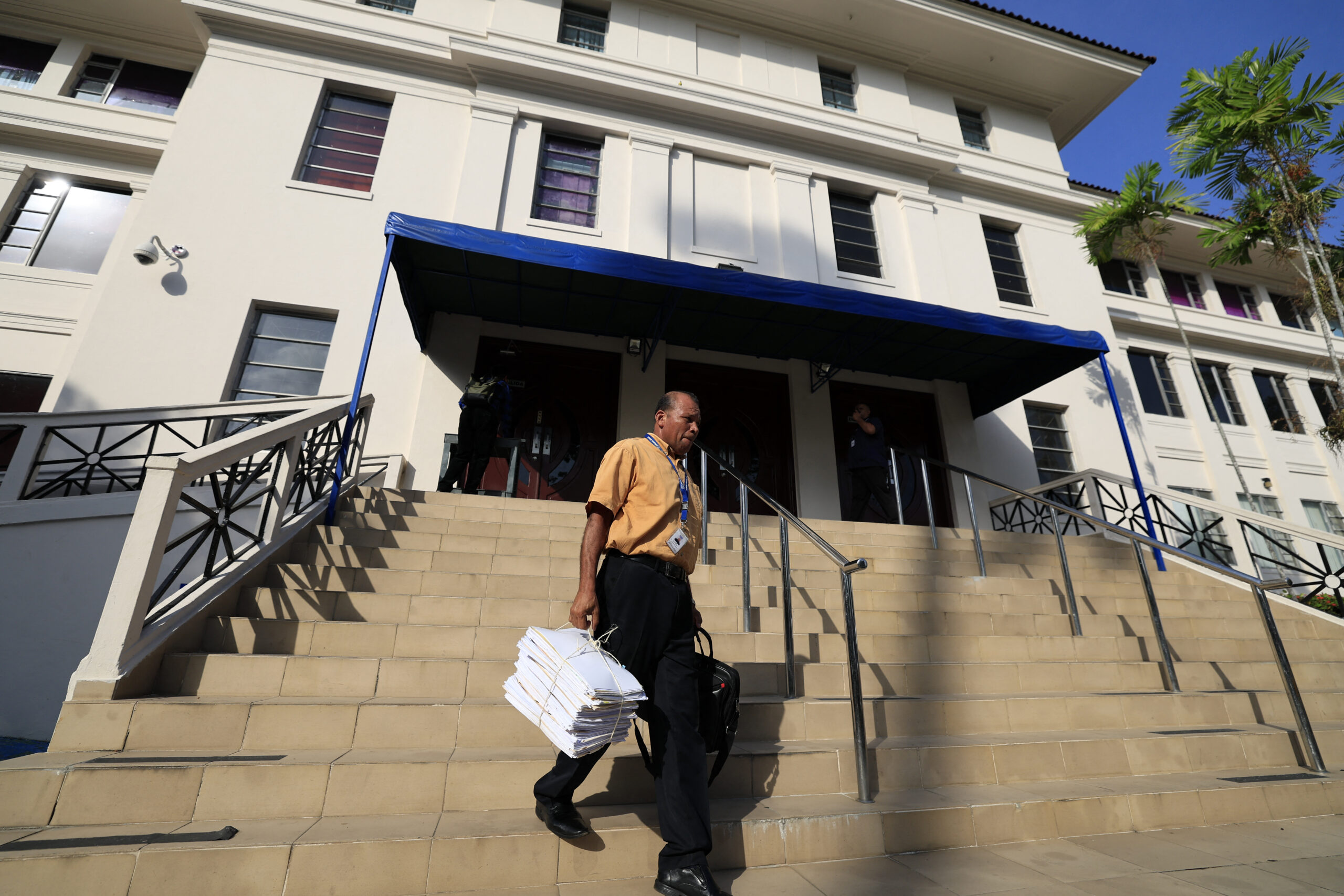Panamanian court acquits 28 defendants in ‘Panama Papers’ trial

A man carries documents outside the courthouse where the “Panama Papers” trial is being held in Panama City on April 8, 2024. A Panama court on June 28, 2024, acquitted 28 people accused of money laundering related to the defunct Panamanian law firm Mossack Fonseca, the epicentre of the international “Panama Papers” scandal, Panama’s judicial body reported. FILE PHOTO/Agence France-Presse
PANAMA CITY, Panama — A Panamanian court has acquitted 28 people charged with money laundering in connection with the now-defunct law firm Mossack Fonseca, the epicenter of the “Panama Papers” international tax evasion scandal.
Among those acquitted on Friday were the firm’s founders, Jurgen Mossack and Ramon Fonseca, the latter of whom died in May in a Panamanian hospital.
During the trial, which was held in the Central American country’s capital in April, the prosecution asked for 12 years in prison for the duo, the maximum sentence for money laundering.
READ: Panama law firm heavily implicated in ‘Pandora Papers’ revelations
However Judge Baloisa Marquinez acquitted the pair and 26 others after finding that evidence taken from the law firm’s servers had not been gathered in line with due process, raising doubts about its “authenticity and integrity,” a court statement said.
Article continues after this advertisementThe judge also ruled that “the rest of the evidence was not sufficient and conclusive to determine the criminal responsibility of the defendants,” the court statement said.
Article continues after this advertisementLeaked documents from Mossack Fonseca in 2016 revealed how many of the world’s wealthy stashed assets in offshore companies, triggering scores of investigations around the globe.
READ: Why few Americans in Panama Papers? Lawyer doesn’t want them
Those implicated included former British premier David Cameron, Russian President Vladimir Putin, football star Lionel Messi, Argentina’s then-president Mauricio Macri and Spanish filmmaker Pedro Almodovar, to name but a few.
‘Justice has been done’
Panamanian prosecutors had alleged that Mossack and Fonseca helped create opaque companies in which executives of the German multinational Siemens deposited millions of euros outside the company’s official accounts.
They were also charged with helping divert money from a massive fraud in Argentina.
“Justice has been done, we are extremely satisfied with the ruling handed down by the judge,” Guillermina McDonald, lawyer for Mossack and other defendants, told AFP.
However, “we are a little sad because along the way we lost Mr. Ramon Fonseca, and he has not been able to see this result,” she added.
The trial began eight years after the International Consortium of Investigative Journalists (ICIJ) began publishing the “Panama Papers” on April 3, 2016.
The investigation, based on 11.5 million leaked documents from Mossack Fonseca, revealed how personalities from around the world hid properties, companies, assets and profits to evade taxes or launder money.
To do so, they created companies through the firm, opening bank accounts and creating shell foundations in multiple countries to hide money, which in some cases came from illicit activities, according to the investigation.
The scandal led to the closure of Mossack Fonseca and shaped the international image of Panama as an offshore tax haven.
“While the court did not hold these defendants accountable, the enduring impact of our investigation persists,” ICIJ executive director Gerard Ryle said in a statement.
“By revealing hidden truths, as we did in the Panama Papers, we empower the public with information they need to demand accountability and push for reforms.”
Offshore companies are not in themselves illegal, and there are numerous legitimate reasons for using them. But they can also be used to launder the proceeds of criminal activities or to conceal misappropriated or politically inconvenient wealth.
“Truly there has been a great injustice that has been done,” Mossack said after the conclusion of the hearing.
“Both my partner and all the people who have worked with me have been serious, honest and correct people,” he added.